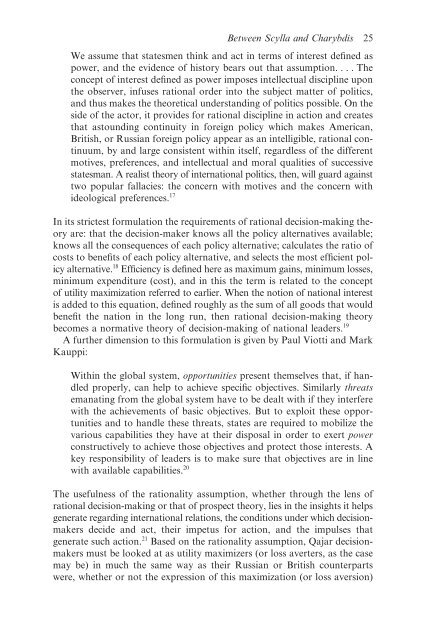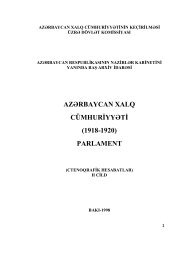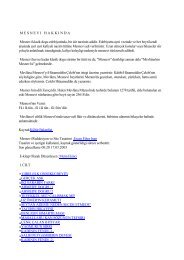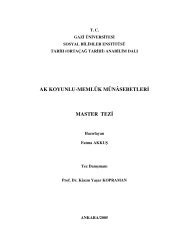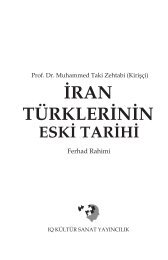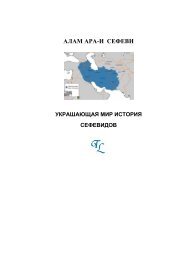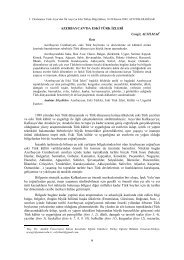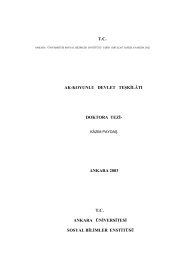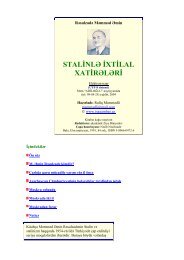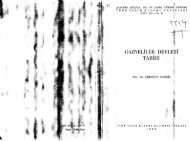War and Peace in Qajar Persia: Implications Past and ... - Oguzlar.az
War and Peace in Qajar Persia: Implications Past and ... - Oguzlar.az
War and Peace in Qajar Persia: Implications Past and ... - Oguzlar.az
- No tags were found...
Create successful ePaper yourself
Turn your PDF publications into a flip-book with our unique Google optimized e-Paper software.
Between Scylla <strong>and</strong> Charybdis 25We assume that statesmen th<strong>in</strong>k <strong>and</strong> act <strong>in</strong> terms of <strong>in</strong>terest def<strong>in</strong>ed aspower, <strong>and</strong> the evidence of history bears out that assumption. ...Theconcept of <strong>in</strong>terest def<strong>in</strong>ed as power imposes <strong>in</strong>tellectual discipl<strong>in</strong>e uponthe observer, <strong>in</strong>fuses rational order <strong>in</strong>to the subject matter of politics,<strong>and</strong> thus makes the theoretical underst<strong>and</strong><strong>in</strong>g of politics possible. On theside of the actor, it provides for rational discipl<strong>in</strong>e <strong>in</strong> action <strong>and</strong> createsthat astound<strong>in</strong>g cont<strong>in</strong>uity <strong>in</strong> foreign policy which makes American,British, or Russian foreign policy appear as an <strong>in</strong>telligible, rational cont<strong>in</strong>uum,by <strong>and</strong> large consistent with<strong>in</strong> itself, regardless of the differentmotives, preferences, <strong>and</strong> <strong>in</strong>tellectual <strong>and</strong> moral qualities of successivestatesman. A realist theory of <strong>in</strong>ternational politics, then, will guard aga<strong>in</strong>sttwo popular fallacies: the concern with motives <strong>and</strong> the concern withideological preferences. 17In its strictest formulation the requirements of rational decision-mak<strong>in</strong>g theoryare: that the decision-maker knows all the policy alternatives available;knows all the consequences of each policy alternative; calculates the ratio ofcosts to benefits of each policy alternative, <strong>and</strong> selects the most efficient policyalternative. 18 Efficiency is def<strong>in</strong>ed here as maximum ga<strong>in</strong>s, m<strong>in</strong>imum losses,m<strong>in</strong>imum expenditure (cost), <strong>and</strong> <strong>in</strong> this the term is related to the conceptof utility maximization referred to earlier. When the notion of national <strong>in</strong>terestis added to this equation, def<strong>in</strong>ed roughly as the sum of all goods that wouldbenefit the nation <strong>in</strong> the long run, then rational decision-mak<strong>in</strong>g theorybecomes a normative theory of decision-mak<strong>in</strong>g of national leaders. 19A further dimension to this formulation is given by Paul Viotti <strong>and</strong> MarkKauppi:With<strong>in</strong> the global system, opportunities present themselves that, if h<strong>and</strong>ledproperly, can help to achieve specific objectives. Similarly threatsemanat<strong>in</strong>g from the global system have to be dealt with if they <strong>in</strong>terferewith the achievements of basic objectives. But to exploit these opportunities<strong>and</strong> to h<strong>and</strong>le these threats, states are required to mobilize thevarious capabilities they have at their disposal <strong>in</strong> order to exert powerconstructively to achieve those objectives <strong>and</strong> protect those <strong>in</strong>terests. Akey responsibility of leaders is to make sure that objectives are <strong>in</strong> l<strong>in</strong>ewith available capabilities. 20The usefulness of the rationality assumption, whether through the lens ofrational decision-mak<strong>in</strong>g or that of prospect theory, lies <strong>in</strong> the <strong>in</strong>sights it helpsgenerate regard<strong>in</strong>g <strong>in</strong>ternational relations, the conditions under which decisionmakersdecide <strong>and</strong> act, their impetus for action, <strong>and</strong> the impulses thatgenerate such action. 21 Based on the rationality assumption, <strong>Qajar</strong> decisionmakersmust be looked at as utility maximizers (or loss averters, as the casemay be) <strong>in</strong> much the same way as their Russian or British counterpartswere, whether or not the expression of this maximization (or loss aversion)


